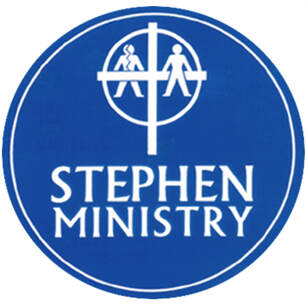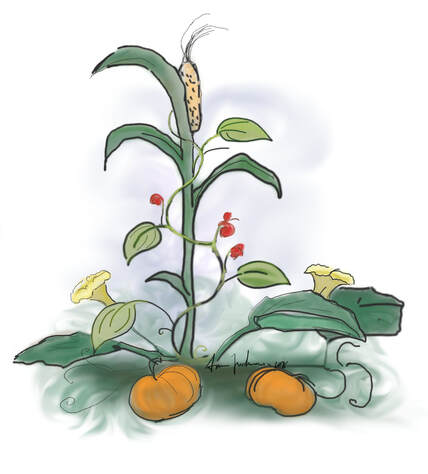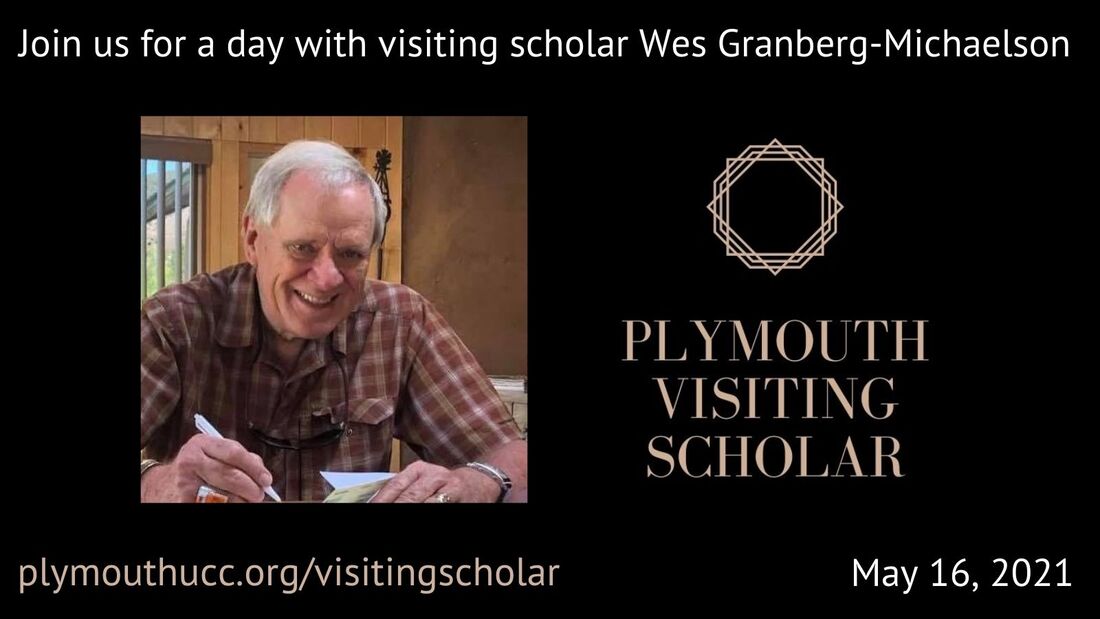|
Last night, I sat on the back patio of a friend and colleague, sipping yummy drinks and eating a slice of pizza. As the sun went down and the mosquitos came out, we chatted about all things church and life. Her wild garden of corn and beans and squash sprawled out among us. She told me that she was working on a "three sisters" garden. Corn, beans, and squash crops are known as the Three Sisters. For centuries these three crops have been the center of Native American agriculture and culinary traditions. It is for a good reason, as these three crops complement each other nutritionally in the garden. My soul became whole in the glow of late summer among sprawling crops.
I’ve always said that I am a big believer in the theological concept called “the priesthood of all believers.” This doctrine asserts that all humans have access to God through Christ. In many ways, this introduced a democratic element in the church's functioning, meaning all Christians were equal: clergy/priests and parishioners. It also means that we are all ministers within a congregational setting, unfolding God’s kin-dom* together. I have seen this happen in many ways over my first six months serving with all of you at Plymouth. In my first week or so, I was introduced to Plymouth’s Stephen Ministers program. The Stephen Minister’s name came from Acts 6:8; the apostles commissioned Stephen to do acts of pastoral care. For Plymouth and many churches, The Stephen Ministers program is trained laypeople that expand the pastor's care by providing quality caring ministry. There is much to say about our Stephen Ministers program and the people at Plymouth that serve in this vital capacity, witnessing and practicing active listening to care receivers at Plymouth. But, more than anything, this program is a beacon to the church that reminds me of what the church is for and what we are in the business of doing. Last night, my colleague said, “I think the church ‘universal’ has forgotten that their role is to provide soul-nurturing.” In other words, our product is about tending to our souls in the way a gardener tends to her crop. Perhaps the church is like the Three Sisters garden, a vital ecosystem that complements each other nutritionally so that our souls are cared for during the winter seasons of life. As a pastor, I began to think of the idea that the church is in the business of soul-nurturing. I am grateful for our Stephen Minister’s program and the work of specially trained volunteers who listen actively and walk with congregants during the darkest periods of life or when the soul simply needs to be nurtured. Marta P.S. To learn more about being a Stephen Minister at Plymouth, visit their page. To request a Stephen Minister at Plymouth, contact me. *Kingdom” suggests a vertical hierarchy and power-over, “kin-dom” suggests a horizontal solidarity and power-with. “Carry each other’s burdens [on the pilgrimage of life] and so fulfill the law of Christ.” From a Stephen Ministry handbook for pastors, Galatians 6.2 CEB “On pilgrim pathways we learn the myth of control, the wisdom of relinquishment, the promise of the unpredictable and the embodiment of grace.” From Without Oars by Wesley Granberg-Michaelson*  This coming Sunday, May 16th, Plymouth celebrates pilgrimage. We will celebrate our individual spiritual, our inward, pilgrimage and our communal faith community, our outward, pilgrimage. We will do this in two distinctive, but connected, ways: through our Visiting Scholar events and through commissioning of our new Stephen Ministers in our 10 a.m. service. Last month I was quite excited to invite you to read our Plymouth Reads book, Without Oars: Casting Off into a Life of Pilgrimage, in preparation for our day with the author, Wesley Granberg-Michaelson. Many of you have taken me up on the invitation. (And there are still books available in the office, $10 cash or check.) This month I am quite excited to introduce you to our Stephen Ministry lay caregiver ministry and our Stephen ministers. How might these two programs be connected? Our Visiting Scholar, Wes Granberg-Michaelson describes pilgrimage as “embodied faith, taking steps ahead that teach us what we need to leave behind.” Our strategic planning team has discerned that “Plymouth’s purpose for the next 3-5 years is to embody beloved community with God, each other and our neighbors.” This coming Sunday, through our Visiting Scholar programming, we will explore being the gathered, worshiping, serving community of church, the Body of Christ, as pilgrimage. Amid this exploration we will commission ten among us to embark on a pilgrimage of embodied care for those in our community who need a companioning presence during tough times. The Stephen Ministry introductory handbook for pastors describes the program as “equipping congregation members to provide distinctively Christian care to those who need it.” After at least 100 hours of training and study Stephen Ministry lay caregivers are prepared to care for their fellow congregants who have experienced a life crisis with on-going, one-on-one attention that pastors cannot always maintain, especially in a larger congregation. Hal and I will continue to be “first responders” in the event of an acute life crisis, such as the death of a loved one, a major medical crisis, job loss or a financial crisis, divorce, family caregiver stress, or a long-term illness. After ministry and care with one of us for an appropriate length of time we can then (with your permission) refer you to the Stephen Minister Referral Coordinator. In Plymouth’s case this is Stephen Minister and Stephen Leader, Eric Ferm, who will follow up to explain the Stephen Ministry caregiving program and assign a Stephen Minister if you are willing. Eric works to coordinate the program with our other two Stephen Minister Leaders, Peter Mullarkey and Lory Clukey. Once a good match is made between caregiver and care receiver, the embodied care of the Stephen Minister lay caregiver begins as they meet with you weekly for as long as their presence is needed, offering empathic listening, prayer, emotional support, and other resources, if needed. (And we, the pastors, will always be available for occasional check-in.) This kind of trained lay caregiving is embodying beloved community and it is a journey of embodied faith, a pilgrimage. Stephen Ministry lay caregiving is only one facet of multi-faceted lay pastoral care program at Plymouth that includes our Calling/Caring visitor program, our annual contact calling/emailing by the deacons, and our new Faith Nurse ministry program. Stay tuned for a vision of the entire pastoral care program and how it works together with the pastors in my June Staff Reflection. Until then, please tune in to our 10 a.m. service and prayerfully support our new Stephen Ministers: Nancy Bryan, Lory Clukey, Karen Dawson, April Mason, Fran Milde, Sara Mullarkey, Anna Olsen, Colleen Silan, and Irene Wherritt. Please tune in Sunday to experience Wes Granberg-Michaelson’s three presentations with us this coming Sunday: his10 a.m. sermon in our prerecorded service, “Can the Pandemic Begin a Pilgrimage?”, his afternoon webinar (1-3 p.m.) mentioned above and his 6 p.m. Zoom service sermon, “Re-entry: Our Congregation’s Pilgrim Progress.” (Get more info and register here for the webinar.) God has joyful, risk-taking, love-giving work for us to do through our beloved community of faith! With you on the pilgrimage, *Wesley Granberg-Michaelson, Without Oars: Casting Off into a Life of Pilgrimage, (Broadleaf Books, Minneapolis, MN, 2020, 112). Click image below to learn more and to register for the afternoon event:
|
Details
|



 RSS Feed
RSS Feed